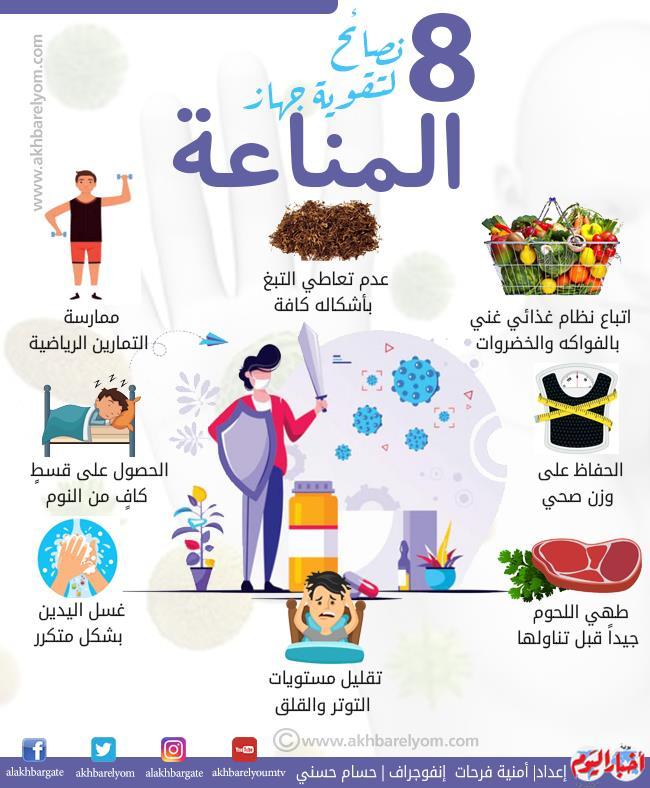8 tips to strengthen the immune system and resist diseases
The immune system plays an essential role in protecting the body from various infections and diseases, and its maintenance requires following a healthy lifestyle, which includes proper nutrition, good sleep and exercise regularly.
In a report published by the American "Insider" website, the writer Rachel McFireson is reviewing some healthy habits that should form part of the daily routine to enhance the immune system and resist diseases.
The orthopedic doctor specializing in career medicine, Lisa Baller, stresses that the diet should include enough antioxidants, vitamins and minerals that enhance the immune system through eating fruits and vegetables.
Among the best fruits and vegetables that provide these nutrients are red and yellow apples, potatoes, cherries and grapes, sweet potatoes, pumpkin, as well as mangoes, mandarin, green kiwi, broccoli, olives, also lemon, pears, bananas, and pineapple, as well as blue berries,The cabbage, cabbage, raisins, brown cauliflower, dates, as well as coconut, nuts, and pickled cabbage.
"The more the diversity of the fruits and vegetables that they consume daily, the greater the nutrients that enhance the immune system," Palier says..
Not getting enough sleep makes you more likely to develop infection, because sleeping is the time when your body is doing its best to combat inflammation and viruses.
In this context, Baller says, "During rest, the body recovers and gets rid of toxins, and those who sleep irregularly may suffer from health disorders that lead to chronic infections.".
These infections in turn weaken the immune system, which makes it less effective in combating viral or bacterial infections.Although the amount of enough sleep for the comfort of the body varies from person to person, most adults need between 7 to 8 hours of sleep per day.
According to Harvard's health magazine, the body must get at least 00.8 grams of proteins per kilogram of body weight to avoid disease.

The lack of proteins in the body affects T -cells (T Cell), which is an essential part of the immune system, because it is responsible for the secretion of antibodies that are resistant to diseases, viruses and bacteria..
Proteins contain high amounts of zinc, which is a mineral that helps in producing white blood cells resistant to infection, and we find it in shellfish, crabs, chicken, chickpeas and cooked beans..
Breibiotk - a vital component in the work of the immune system - helps enhance the beneficial bacteria in the intestine, and we find it in many foods such as onions, garlic, bananas and asleep..
Periphiotte increases the beneficial bacteria in the gut, which in turn stimulates the production of anti -inflammatory cytokines, which are small proteins that enhance the immune system.
According to a wide range of research, tension is directly related to the weakness of the immune system.Stress causes the secretion of a number of hormones, such as adrenaline, dopamine, nortrinaline and cortisol, which are hormones that reduce the body's ability to form lymphocytes that help fight viruses and harmful bacteria..
Any healthy diet should include vitamins such as "A", "C", "D" and "B6", and minerals such as zinc, iron and selenium.
Vitamins are one of the most important antioxidants, and help to maintain a strong immune system, and among the foods rich in these vitamins, carrots, sweet potatoes, sweet pepper, strawberries, almonds, avocado and salmon, as well as shellfish, tuna and chicken breasts free of fat and beef.
Performing physical activity regularly an important factor in strengthening the immune system.A study indicated that exercise reduces infections, improves immunity, and helps delay the negative effects of aging.Moderate exercises such as walking can reduce the risk of disease.
Palier says smoking "increases the risk of infection by destroying antibodies from the bloodstream, which is the proteins produced by the immune system to fight external infection.".
"Smoking cigarettes also destroys lung tissue and reduces their ability to resist infection, which makes smokers more vulnerable to respiratory diseases such as influenza and Corona virus," she added, which makes smokers more likely to develop respiratory diseases such as influenza and Corona virus..
To enhance immunity and infection resistance, Balreer says, "It is necessary to wash hands for 20 seconds before and after exposure to any potential sources of viruses, such as preparing food, caring for a sick person, wounding, or having a cold, sneezing, coughing, or runny in the nose.".










